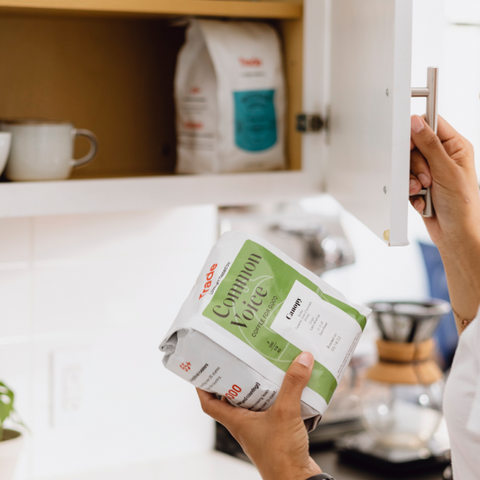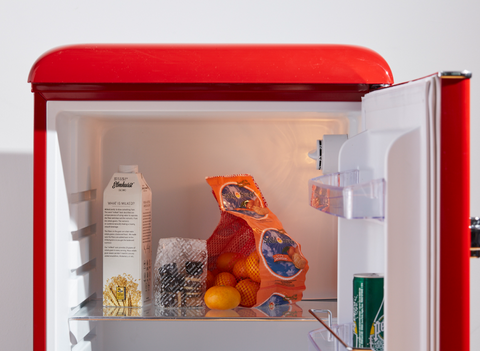So, you’ve gotten a delicious bag of coffee delivered to your door. Maybe you've even bought in bulk. You’re excited to drink it and the first cup tastes totally delicious, even better than you imagined! Assuming you’re not hosting a perfectly-timed and well-attended brunch, it’s time to put that coffee away — but not just anywhere will do! You want to put your coffee away in a place that’ll ensure it tastes delicious for as long as it takes you to finish it. What to do? We will teach you how to store coffee beans!
What does freshness mean for coffee beans?
The concept of coffee freshness in the popular imagination is a relatively new one, like most specialty coffee concepts. I’ve found bags of coffee in my parents cupboard that were literally years old. And they’ve asked me if I wanted to try them. That's understandable, because unlike many of the things we consume, coffee doesn’t spoil in a traditional way. Old coffee doesn't smell rotten and it won't make you sick. It doesn't even really look different, in the way that, for example, an old chocolate bar looks whiter than it used to.
But the taste difference in an older coffee is definitely noticeable. Even if it’s not gross, like an old bag of spinach, older coffee loses a lot of what makes that coffee special. That's especially the case for those aromatics that help the flavors really pop.
Getting started with coffee storage

Our first tip for coffee storage begins with shopping. If you’re at all skilled at buying the correct amount of groceries, try bringing that same energy to your coffee buying habits. Keep note of how long it takes you to go through a bag, and try not to buy coffee online more frequently than you need to. You'll still want to know how to store coffee properly even if you’re not planning to store it for months, but it does make freshness concerns a little less important.
Knowing the correct amount of coffee to buy and what your coffee preference is will help tremendously with knowing how to store coffee to keep it as fresh as possible. We want to avoid stale beans (Ie stale coffee), so it is important to understand the frequency of your consumption. If you go through your coffee quickly, it may be more convenient to store it in the original coffee bag for ease. However, if you go through slowly or are buying in bulk, using an airtight container is going to be the best way to keep your coffee fresh while storing.
Most advice I've encountered describes your kitchen as a rogues gallery of villains trying to attack your coffee, which I think is pretty hilarious. The first of these villains — in a shocking betrayal considering how often we rely on it to live — is air. The flavor we call “stale,” whether in reference to coffee beans or to cold brew that’s been sitting around for a while, is largely the flavor of oxidation.
Many roasters have reacted to this problem by putting a plastic zipper directly in each coffee bag, which is certainly not 100 percent airtight, but definitely an improvement over twist ties. If you want to transfer coffee out of the bag, as long as it's already a few days off roast, look for as airtight of a container as possible. There are plenty of canisters with relatively airtight snap lids made for food storage out there, and mason jars or tupperware, which you probably already have on hand, will do the trick as well.
Heat is pretty much never good for coffee until you start brewing.
The jar only works though, if you keep that coffee out of direct sunlight. Your coffee’s tan enough, so those UV rays are going to do nothing but cause harm. Rule of thumb: bright spots near a sunny window, bad; dark cabinets and pantries, good. That principle applies even in an opaque container, as heat is pretty much never good for coffee until you start brewing. Oxidation works faster when it’s warmer, so while coffee won’t spoil without refrigeration the way milk does, cooler is generally better!
Settling the freezer debate

So why, then, is there still debate about whether or not to put coffee in your freezer or refrigerator? As far as whether coffee can and should be frozen in general, the answer is a relatively agreed upon: Yes! Freezing coffee beans will cause them to oxidize slower, preserve coffee's bright flavors, and it will seemingly help coffee grind more evenly. The question lies in how said coffee is frozen.
Here, an air-tight container becomes even more important. Coffee beans are pretty porous and can take on aroma easily, so if you have other food in your freezer, the danger of your beans absorbing aromas from pork chops and veggies is very real (some die hards have gone so far as to buy a separate freezer just for frozen beans). And if you’re storing coffee for more than a few months without an airtight container, there’s the added danger of freezer burn.
Anybody freezing coffee for professional purposes does so in vacuum sealed bags that really get out all the oxygen. If you happen to own that equipment for food storage, you now have another use for it. For the rest of us, just aim for as airtight as possible. Zippable plastic freezer bags with as much air squeezed out as possible are totally fine for short-term freezes.
Another fear for frozen coffee is condensation; if that coffee comes out of the freezer and is exposed to oxygen, will water vapor condense into liquid on its surface and give you wet beans? If your coffee is really well-sealed, you could guarantee this doesn’t happen by taking it out of the fridge and letting it come to room temperature for about 15 minutes before brewing to avoid additional moisture. In my experience, though, as long as you work quickly, you can get that coffee out of the bag and into the grinder before seeing most ill effects.
Let's summarize: coffee storage tips
- Set your coffee buying schedule so you’re just about done with your bag of coffee when the new one arrives (hint: you can automatically set your coffee subscription to do the planning for you!)
- Buy whole bean and grind it fresh if at all possible
- Store your beans in an airtight container
- Keep your beans away from sunlight and heat
- Use the freezer for storing coffee longer-term
- When using coffee from the freezer, take out only as much as you need, moving quickly. Then put the rest back in the freezer ASAP!









